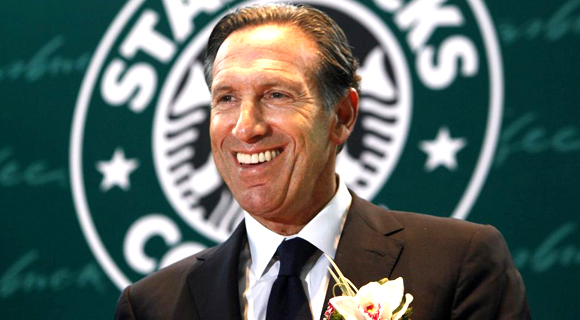

Howard Schultz’s decision to step down from the Starbucks board last week naturally led to speculation about his future plans. Most of it centered on politics, and whether Schultz would offer himself up as a 2020 Democratic CEO alternative to President Trump. Let’s hope Schultz stays out of politics. He’s too good for what’s seedy.
Up front, this is not an endorsement of Trump. While there’s good and bad with every president, the hope with all presidents is that separation of powers limits their ability to do much of anything. No doubt all of us, including yours truly, have policy ideas that we think would have a positive impact on the country. That’s all well and good, but logic tells us that the American people will benefit the most from the president who does the least. To err is human, and when presidents invariably err, their mistakes are often felt around the country, and sometimes around the world. Inaction in the White House is the ultimate virtue.
The above speaks to the obvious problem with Schultz. He’s expressed interest in public service. He wants to do something. That’s dangerous. And it runs counter to the Founders’ vision of a limited federal government whereby most legislation is local. With it local, people can choose their policy bliss based on city or state lived in.
If Schultz wants to do something, he should run for local office. And try his policy ideas out locally. Schultz’s businesses experiences recommend the latter. Figure that Starbucks regularly experimented over the years on the way to various successes and failures; the crucial point here that Starbucks’ failures were its own. What works well in business will also work in policymaking. Let’s keep it local. More to the point, let’s not nationalize bad ideas.
Up front, Schultz has already floated a questionable idea. Interesting about what’s questionable is that it’s something that would appeal to many on the right. Getting more specific, the leftward drift of the Democratic party concerns Schultz. Thumbs up. Schultz wonders how some of the fringe Dems plan to pay for their silly ideas that include single-payer healthcare along with a job guarantee program. Big thumbs up. As this column recently pointed out, Democrats like Bernie Sanders and Corey Booker have few peers when it comes to ridiculous policy views. Schultz seems to agree. Schultz would seemingly run as a different kind of Democrat, one focused on economic growth. Amen to that.
Where he gets off track is in his elevation of entitlement reform. About this, most on the right would say his willingness to be honest about federal waste is a good thing. And in a sense it is. Every dollar the federal government spends amounts to that same federal government having more control over the economy. Federal spending is the ultimate tax. The problem is that Schultz assumes, as some Republicans do, that reform of Social Security, Medicare and other entitlement programs will immediately shrink the size and future cost of government. Lots of luck there.
Indeed, the reason why entitlement reform is a fool’s errand is revealed through the other boneheaded ideas offered up by Booker, Sanders, plus Republicans who’ve similarly reveled in spending the money of others over the years. Assuming so-called “savings” from reduced spending on Social Security and Medicare, the political class will rapidly find all new ways to waste the money. To be blunt, Social Security reform will make what’s even more ridiculous and costly (a jobs guarantee program, for instance, or a guaranteed income) more likely.
So while Social Security and Medicare were and are comically bad ideas, the paradoxical genius of their high and rising cost is that they somewhat limit the ability of the political class to introduce even dumber replacements. This is too easily forgotten amid the clamor for reform. The latter is not the same as shrinking government. More likely it just frees politicians to divine new ways to waste our money in size fashion. Schultz sees reform as an issue to run on, but it’s actually a reminder of his amateurism: not only is major reform of anything unlikely in Washington, the result of such grand policymaking likely wouldn’t be so grand.
more recommended stories
 Fentanyl Seizures at Border Continue to Spike, Making San Diego a National Epicenter for Fentanyl Trafficking
Fentanyl Seizures at Border Continue to Spike, Making San Diego a National Epicenter for Fentanyl TraffickingFentanyl Seizures at Border Continue to.
 Utah Man Sentenced for Hate Crime Attack of Three Men
Utah Man Sentenced for Hate Crime Attack of Three MenTuesday, August 8, 2023 A.
 Green Energy Company Biden Hosted At White House Files For Bankruptcy
Green Energy Company Biden Hosted At White House Files For BankruptcyAug 7 (Reuters) – Electric-vehicle parts.
 Former ABC News Reporter Who “Debunked” Pizzagate Pleads Guilty of Possessing Child pδrn
Former ABC News Reporter Who “Debunked” Pizzagate Pleads Guilty of Possessing Child pδrnFriday, July 21, 2023 A former.
 Six Harvard Medical School and an Arkansas mortuary Charged With Trafficking In Stolen Human Remains
Six Harvard Medical School and an Arkansas mortuary Charged With Trafficking In Stolen Human RemainsSCRANTON – The United States.
 Over 300 People Facing Federal Charges For Crimes Committed During Nationwide Demonstrations
Over 300 People Facing Federal Charges For Crimes Committed During Nationwide DemonstrationsThe Department of Justice announced that.
